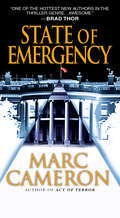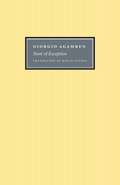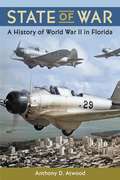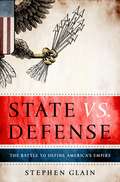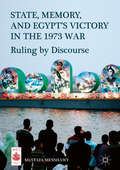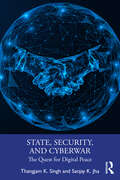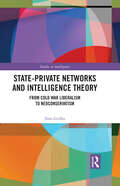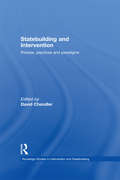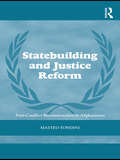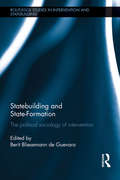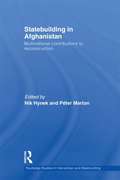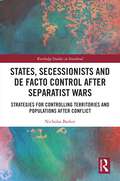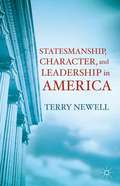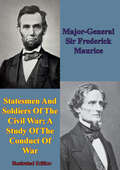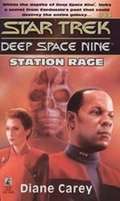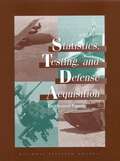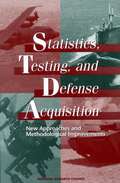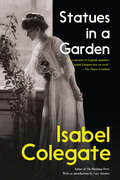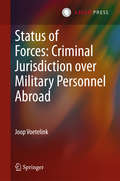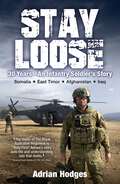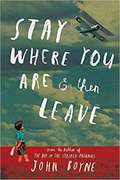- Table View
- List View
State of Emergency (A Jericho Quinn Thriller #3)
by Marc CameronIt&’s countdown to Armageddon for an OSI agent in this thriller by theNew York Times-bestselling author of Stone Cross and Tom Clancy Code of Honor… Two agents, Russian and American, are brutally murdered. College students, working as drug mules, die gruesome deaths from radiation poisoning. Powerful dirty bombs explode minutes apart in San Francisco and St. Petersburg, Russia—slaughtering citizens and spreading blind panic throughout the world. But this is only a warning. The next attack will be nuclear. Enter Air Force OSI agent Jericho Quinn and his crack team of specialists. Their mission: track down the black-market arms dealer who masterminded the plot—with a Soviet-era suitcase-sized bomb—and dismantle them both. When the trail leads to South America, Quinn has to join the famous Dakar Rally, a 6,000-mile motorcycle run that's about to become the most dangerous race in history. It&’s not the finish line they're racing for. It&’s the fate of the world. &“One of the hottest new authors in the thriller genre.&”—#1 New York Times-bestselling author Brad Thor &“A compelling, never-give-an-inch hero who will appeal to Jack Reacher fans.&”—Booklist
State of Exception
by Giorgio Agamben Kevin AttellTwo months after the attacks of 9/11, the Bush administration, in the midst of what it perceived to be a state of emergency, authorized the indefinite detention of non citizens suspected of terrorist activities and their subsequent trials by a military commission. Here, distinguished Italian philosopher Giorgio Agamben uses such circumstances to argue that this unusual extension of power, or "state of exception", has historically been an under examined and powerful strategy that has the potential to transform democracies into totalitarian states. The sequel to Agamben's "Homo Sacer: Sovereign Power" and "Bare Life, State of Exception" is the first book to theorize the state of exception in historical and philosophical context. In Agamben's view, the majority of legal scholars and policymakers in Europe as well as the United States have wrongly rejected the necessity of such a theory, claiming instead that the state of exception is a pragmatic question. Agamben argues here that the state of exception, which was meant to be a provisional measure, became in the course of the twentieth century a normal paradigm of government. Writing nothing less than the history of the state of exception in its various national contexts throughout Western Europe and the United States, Agamben uses the work of Carl Schmitt as a foil for his reflections as well as that of Derrida, Benjamin, and Arendt.
State of War: A History of World War II in Florida
by Anthony D. AtwoodA deeply researched history of Florida’s strategic and military roles in World War II The first book to share the entire history of Florida’s involvement in World War II, State of War explores how the war transformed the state into a major hub of military industry and an important training base for ground, naval, and air forces.Drawing on historic photographs, military archival data, and civilian reporting in newspapers of the time, Anthony Atwood explores Florida’s military history and geography during the war years. The state offered strategic potential in both its available space and its location near critical sea lanes. This unique combination made Florida the site of over 250 military installations and a launching pad for US military power around the globe. Florida was even a seat of war, serving as headquarters for the Battle of the Gulf-Sea Frontier against Nazi U-boats.Atwood also uses census data to show how the demographics of Florida were changed by the war. Before World War II, less than two percent of Americans lived in Florida and the state was seen as a quiet, rural southern backwater. During the war there were more soldiers than civilians in Florida and the influx of people led to rapid urbanization. Atwood describes how hundreds of thousands of women helped build ships and aircraft and African Americans fought a battle in two fronts—to win the war against the Nazis and to win civil rights at home. World War II accelerated the state’s relationship with the military, and this book details the war’s lasting impacts. In addition to the airports and other infrastructure built during wartime, Florida remains an important part of military operations. Florida is now the base of three unified combatant commands of the US Department of Defense and is home to the third largest population of veterans in the nation.
State vs. Defense: The Battle to Define America's Empire
by Stephen GlainA masterful account of how sixty years of American militarism created the Cold War, fanned decades of unnecessary conflict, helped to fuel Islamist terror, and threatens to bankrupt the country. For most of the twentieth century, the sword has led before the olive branch in American foreign policy. In eye-opening fashion, State vs. Defense shows how America truly operates as a superpower and explores the constant tension between the diplomats at State and the warriors at Defense. State vs. Defense characterizes all the great figures who crafted American foreign policy, from George Marshall to Robert McNamara to Henry Kissinger to Don Rumsfeld with this underlying theme: America has become increasingly imperial and militaristic. Take, for example, the Pentagon, which as of 2010, acknowledged the concentration of 190,000 troops and 115,000 civilian employees inside 909 military facilities in 46 countries and territories. The price of America's military-base network overseas, along with the expense of its national security state at home, is enormous. The bill comes in at well over $1 trillion. That is equal to nearly 8 percent of GDP and more than 20 percent of the federal budget. (By comparison, China, Russia, Cuba, Iran, and North Korea, the five countries Pentagon planners routinely trot out as conventional threats to the national well-being, have a cumulative security budget of just over $200 billion.) Quietly, gradually--and inevitably, given the weight of its colossal budget and imperial writ--the Pentagon has all but eclipsed the State Department at the center of U.S. foreign policy. In the tradition of classics such as The Wise Men, The Best and the Brightest, and Legacy of Ashes, State vs. Defense explores how and why American leaders succumbed to the sirens of militarism, how the republic has been lost to an empire, and how "the military-industrial complex" that Eisenhower so famously forewarned has set us on a stark path of financial peril.
State, Memory, and Egypt’s Victory in the 1973 War
by Mustafa MenshawyThis book explores and problematises the war discourse regarding Egypt's victory in the 1973 War. It traces the process through which this discourse was constructed and reconstructed by the state throughout the periods of President Anwar Sadat, his successor Hosni Mubarak, and afterwards. It uses Critical Discourse Analysis to combine analysis of texts commemorating the war with a study of the socio-political milieu related to personal authoritarianism and the state's intricate relations with the army, the press and Islamists.
State, Security, and Cyberwar: The Quest for Digital Peace
by Thangjam K. Singh Sanjay K. JhaThis book examines the complex interactions amongst states and security apparatuses in the contemporary global order, and the prospect of peace with the emergence of cyberwarfare. Analysing why states consider cyberspace as a matter of security and strategic concerns, it looks forward to a possible foundation of ‘cyberpeace’ in the international system. It examines the idea of cyber-territory, population, governance, and sovereignty, along with that of nation states referring to great, middle, and small powers.The book explores the strategic and security aspects of cyberspace along with the rational behaviours of states in the domain. It explains the militarisation and weaponisation of cyber technologies for strategic purpose and traces the progression of cyber war and its impact on global stability. The last section of the book examines the possibility of building peace in che cyber domain with the endeavours of the international community to safeguard cyber sovereignty and promote stability in the digital sphere.It also discusses India’s position on digital security, cyberwarfare, and the pursuit of cyberpeace. The book offers valuable insights for students, researchers, practitioners, stakeholders working in and on military and strategic affairs, peace and conflict studies, and global politics, as well as interested general readers.
State, society and mobilization in Europe during the First World War
by John HorneThis volume examines political and cultural mobilisation in the face of industrialised mass death during the First World War. Comparing Britain, France, Germany, Italy and Austria-Hungary, it generates arguments on mobilisation and 'total war' which have wider relevance. It explores 'national ideals' which cast the war as a crusade, the inclusive 'self-mobilisation' of sectional identities and private organisations behind national efforts, and the exclusion of suspect groups (the 'enemy within') from the mobilisation process. It also highlights the importance, and difficulty, of assessing the limits of mobilisation as well as the differing capacities of the state to sustain it, factors related to prior degrees of national integration and political legitimacy. Mobilisation in this sense was an important factor which determined the outcome and legacy of the war.
State-Private Networks and Intelligence Theory: From Cold War Liberalism to Neoconservatism (Studies in Intelligence)
by Tom GriffinThis book examines the United States neoconservative movement, arguing that its support for the 2003 invasion of Iraq was rooted in an intelligence theory shaped by the policy struggles of the Cold War. The origins of neoconservative engagement with intelligence theory are traced to a tradition of labour anti-communism that emerged in the early 20th century and subsequently provided the Central Intelligence Agency with key allies in the state-private networks of the Cold War era. Reflecting on the break-up of Cold War liberalism and the challenge to state-private networks in the 1970s, the book maps the neoconservative response that influenced developments in United States intelligence policy, counterintelligence and covert action. With the labour roots of neoconservatism widely acknowledged but rarely systematically pursued, this new approach deploys the neoconservative literature of intelligence as evidence of a tradition rooted in the labour anti-communist self-image as allies rather than agents of the American state. This book will be of great interest to all students of intelligence studies, Cold War history, United States foreign policy and international relations.
Statebuilding and Intervention: Policies, Practices and Paradigms (Routledge Studies in Intervention and Statebuilding)
by David ChandlerThis edited book sets out and engages with some of the key policies, practices and paradigms of external intervention in the case of state support and reconstruction. Many assumptions about statebuilding have been reconsidered in the wake of Iraq, and ongoing problems in other states such as Afghanistan, Bosnia and Kosovo. Rather than being a regional survey or a policy-orientated ‘lessons learned’ book, this collection explores the broader framing of policy goals, statebuilding practices and the consensus on the need for Western states and international institutions to be engaged in this policy area. The volume is divided into three parts: the first engages with some of the key policy frameworks and conceptual issues raised by recent statebuilding interventions; the second considers core statebuilding practices; and the third reconsiders statebuilding paradigms more broadly. The essays open up debate and critical discussion in the field at a time when many advocates of extending statebuilding intervention suggest that the complex nature of the problems of non-Western states and societies mean that it will inevitably be contradictory and limited in its results.
Statebuilding and Justice Reform: Post-Conflict Reconstruction in Afghanistan (Cass Series on Peacekeeping)
by Matteo TondiniThe book provides an updated account of justice reform in Afghanistan, which started in the wake of the US-led military intervention of 2001. In particular, it focuses on the role of international actors and their interaction with local stakeholders, highlighting some provisional results, together with problems and dilemmas encountered in the reform activities. Since the mid-1990s, justice system reform has become increasingly important in state-building operations, particularly with regard to the international administrations of Bosnia, Kosovo, East Slavonia and East Timor. Statebuilding and Justice Reform examines in depth the reform of justice in Afghanistan, evaluating whether the success of reform may be linked to any specific feature or approach. In doing so, it stresses the need for development programmes in the field of justice to be implemented through a multilateral approach, involving domestic authorities and other relevant stakeholders. Success is therefore linked to limiting the political interests of donors; establishing functioning pooled financing mechanisms; restricting the use of bilateral projects; improving the efficacy of technical and financial aid; and concentrating the attention on the ‘demand for justice’ at local level rather than on the traditional supply of financial and technical assistance. This book will be of much interest to students of Afghanistan, intervention and statebuilding, peacekeeping, and post-conflict reconstruction, as well as International Relations in general. Matteo Tondini is a researcher and a legal advisor. He has served as a project advisor to the Embassy of Italy in Kabul, Development Cooperation Unit, working within the ‘Afghanistan Justice Program’ and has a Phd in Political Systems and Institutional Change, from the Institute of Advanced Studies, Lucca, Italy.
Statebuilding and Police Reform: The Freedom of Security (Routledge Studies in Intervention and Statebuilding)
by Barry J. RyanThis book explores how and why police reform became an international phenomenon in the era of statebuilding that followed the end of the Cold War. Police reform has become an indispensible element in the spread of liberal democracy. Policing is distinguished by its ability to combine reasonable and forcible methods to preserve and spread liberal values. The book examines the reason police reform was introduced as a method of building consensus in Latin America and the Balkans and documents the development of its use in Africa, the Middle East and the Caucasus region. It illustrates how police power binds the liberal value of freedom to the security needs of post-conflict regions and discusses its force as a strategy to bring law and order to a global security domain. Drawing on a multi-disciplinary approach to the subject, the book delves deeply into policing as a method to bring coherence to global security. It traces the presence of coherent police strategies in contemporary international relations through studies of the United Nations, the European Union and the Organization for Security and Cooperation in Europe. By contrasting police reform with security sector reform, the book explores how liberal peace is imagined by the international NGO sector, state aid agencies and international organizations. This book will be of much interest to students of statebuilding, post-conflict reconstruction, critical security studies, development studies and IR in general.
Statebuilding and State-Formation: The Political Sociology of Intervention (Routledge Studies in Intervention and Statebuilding)
by Berit Bliesemann de GuevaraThis book examines the ways in which long-term processes of state-formation limit the possibilities for short-term political projects of statebuilding. Using process-oriented approaches, the contributing authors explore what happens when conscious efforts at statebuilding ‘meet’ social contexts, and are transformed into daily routines. In order to explain their findings, they also analyse the temporally and spatially broader structures of world society which shape the possibilities of statebuilding. Statebuilding and State-Formation includes a variety of case studies from post-conflict societies in Africa, Asia and Europe, as well as the headquarters and branch offices of international agencies. Drawing on various theoretical approaches from sociology and anthropology, the contributors discuss external interventions as well as self-led statebuilding projects. This edited volume is divided into three parts: Part I: State-Formation, Violence and Political Economy Part II: Governance, Legitimacy and Practice in Statebuilding and State-Formation Part III: The International Self – Statebuilders’ Institutional Logics, Social Backgrounds and Subjectivities The book will be of great interest to students of statebuilding and intervention, war and conflict studies, international security and IR.
Statebuilding in Afghanistan: Multinational Contributions to Reconstruction (Routledge Studies in Intervention and Statebuilding)
by Nik Hynek Péter MartonThis edited volume empirically maps and theorises NATO-ISAF’s contribution to peacebuilding and reconstruction in Afghanistan. The book provides a contextual framework of the NATO participation in Afghanistan; it offers an outline of the security situation in Afghanistan and discusses geopolitical, historical, and military factors that are related to it. It argues that a general underlying factor is that although the stated goals of the Afghanistan mission may be similarly formulated across the ISAF coalition, that are a great number of differences in the nature of coalition members’ political calculations, and share of the burden, and that this induces a dynamic of alliance politics that state actors attempt to either mitigate, navigate, or exploit - depending on their interests and views. The book asks why there are differences in countries’ share of the burden; how they manifest in different approaches; and how the actual performance of different members of the coalition ought to be assessed. It argues that understanding this offers clues as to what does not work in current state-building efforts, beyond individual countries’ experiences and the more general critique of statebuilding philosophy and practice. This book answers key questions through a series of case studies which together form a comparative study of national contributions to the multilateral mission in Afghanistan. In so doing, it provides a uniquely sensitive analysis that can help explain coalition contributions from various countries. It will be of great interest to students of Afghanistan, Asian politics, peacebuilding, statebuilding, war and conflict studies, IR and Security Studies generally.
States, Secessionists and De Facto Control after Separatist Wars: Strategies for Controlling Territories and Populations after Conflict (Routledge Studies in Statehood)
by Nicholas BarkerThis book investigates how states and secessionists seek to resolve questions of de facto control in the aftermath of secessionist wars.This work presents a study of the termination and aftermath of separatist wars, using two in-depth case studies – the Georgia-Abkhazia conflict (1994-2006) and the Serbia-Kosovo conflict (1999-2008) – to develop an empirically grounded theoretical framework to explain state and secessionist strategies for controlling territory and populations in post-war environments. It draws on fieldwork and archival research carried out in Georgia, Abkhazia, Serbia, Kosovo, and the UN archives and presents further evidence to develop and extend the framework using ‘shadow cases’ of the separatist wars in the Caucasus and the Balkans. By focusing on actors’ objectives and their strategies for controlling territory and populations within the constraints and opportunities of a post-war context, this study helps explain what states and secessionists do and why in the critical period after a war ends and helps inform understanding of the formation and trajectories of post-war orders. This study has relevance for international policymakers, with reflections on how the theoretical framework may facilitate conflict analysis and inform policy responses towards protracted armed conflict.This book will be of interest to students of statehood, intra-state conflict and civil wars, international security, and International Relations in general.
Statesmanship, Character, and Leadership in America
by Terry NewellNewell examines noted Americans at seven critical turning points in American history to look at what it takes to be a statesman. Through a powerful speech and the events preceding and following it, they show us how they grappled with conflicting values, varying demands, and the uncertainties of trying to forge a good society.
Statesmen And Soldiers Of The Civil War; A Study Of The Conduct Of War
by Major-General Sir Frederick MauriceMajor-General Maurice, although a British officer, was fascinated by the American Civil War, and wrote a number of important works on the conflict; even editing and publishing for the first time, the famous memoirs of General Robert E. Lee's aide de camp Colonel Marshall.In this volume he analyses the relationship between the statesmen and their generals; in both the Confederacy and the Union there was much friction between the generals in the field and their political masters. The author takes two relationships, one successful and the other disastrous, from both sides of the firing line to scrutinize. On the Confederate side the frictions and breaches of Jefferson Davis and General J. E. Johnston are contrasted with the former's affinity and dependence on General Robert E. Lee. In the Union ranks the frustrations and goading of Lincoln and General McClellan are balanced by the support and trust of the President's dealings with General U.S. Grant.In closing his work General Maurice also touches on his opinions for the conduct of successful relations between politicians and the military and illustrates them with examples from the more recent First World War.
Station Rage
by Diane CareyWhat begins as a sticky political problem soon evolves into full-scale chaos for Commander Sisko when a tomb of Cardassian soldiers is discovered on Deep Space Nine . While Sisko searches for a diplomatic way to return the soldiers to Cardassia, the "bodies" begin to pulsate with life, determined to seek revenge on the enemies now occupying the former Cardassian stronghold. But as the soldiers launch their attack to cripple the station, and Sisko struggles to regain control, another old enemy plots to destroy the soldiers at any cost -- even if it means destroying Deep Space Nine as well!
Statistics, Testing, and Defense Acquisition: Background Papers
by Michael L. Cohen Duane L. Steffey John E. RolphThe National Academies Press (NAP)--publisher for the National Academies--publishes more than 200 books a year offering the most authoritative views, definitive information, and groundbreaking recommendations on a wide range of topics in science, engineering, and health. Our books are unique in that they are authored by the nation's leading experts in every scientific field.
Statistics, Testing, and Defense Acquisition: New Approaches and Methodological Improvements
by Michael L. Cohen Duane L. Steffey John E. RolphFor every weapons system being developed, the U.S. Department of Defense (DOD) must make a critical decision: Should the system go forward to full-scale production? The answer to that question may involve not only tens of billions of dollars but also the nation's security and military capabilities. In the milestone process used by DOD to answer the basic acquisition question, one component near the end of the process is operational testing, to determine if a system meets the requirements for effectiveness and suitability in realistic battlefield settings. Problems discovered at this stage can cause significant production delays and can necessitate costly system redesign.This book examines the milestone process, as well as the DOD's entire approach to testing and evaluating defense systems. It brings to the topic of defense acquisition the application of scientific statistical principles and practices.
Statistics, Testing, and Defense Acquisition: New Approaches and Methodological Improvements
by Panel on Statistical Methods for Testing Evaluating Defense SystemsFor every weapons system being developed, the U.S. Department of Defense (DOD) must make a critical decision: Should the system go forward to full-scale production? The answer to that question may involve not only tens of billions of dollars but also the nation's security and military capabilities. In the milestone process used by DOD to answer the basic acquisition question, one component near the end of the process is operational testing, to determine if a system meets the requirements for effectiveness and suitability in realistic battlefield settings. Problems discovered at this stage can cause significant production delays and can necessitate costly system redesign.This book examines the milestone process, as well as the DOD's entire approach to testing and evaluating defense systems. It brings to the topic of defense acquisition the application of scientific statistical principles and practices.
Statues in a Garden: A Novel
by Isabel ColegateNever before available in the United States, this rediscovered masterpiece from Isabel Colegate, author of The Shooting Party, offers readers "just the right mixture of doomed fun, melancholy and faintly lascivious despair" (The Observer)&“I am afraid I have something to tell you . . . It is that we are all about to be destroyed.&” 1914. The old standards are going. There is bitterness in politics, talk of civil war in Ireland. But all this means little to Cynthia Weston, the attractive wife of cabinet member Aylmer Weston, and her nephew by marriage, Philip. They are caught up in the charmed, perilous toils of a mutual passion that will destroy all they hold most dear—while the shadow of war lengthens and darkens, ready to swallow them whole.A captivating portrait of a lost world, Statues in a Garden is a rediscovered masterpiece by one of the most important and neglected British female writers of the twentieth and twenty-first centuries.
Status of Forces: Criminal Jurisdiction over Military Personnel Abroad
by Joop VoetelinkThis book brings into focus the legal status of armed forced on foreign territory within, inter alia, the context of multi-national exercises and a variety of so-called crisis management operations. When it comes to criminal offences committed by military personnel while abroad it is important to know whether such offences fall under the criminal jurisdiction of the Sending State or that of the Host State. The book analyses this question from two different perspectives, namely traditional public international law and military operational law. Taking his readership through two hundred years of international practice the author arrives at the current practice of laying down the status of forces deployed abroad in so-called Status of Forces Agreements (SOFAs). Having looked at SOFAs from the two different law perspectives the author proposes the development of a "Status of Forces Compendium" to serve as a kind of guideline for future SOFAs. The author's intention in proposing this idea is to instigate further discussion on the subject in public international law and criminal law circles and among armed forces' legal advisors. Joop Voetelink is an Associate Professor of Military Law at the Netherlands Defence Academy.
Stauffenberg, Symbol of Resistance: The Man Who Almost Killed Hitler
by Wolfgang VenohrA biography of the man who lead the secret mission to kill Adolph Hitler and topple the Nazi regime, from an award-winning historian. On 20th July 1944, senior officers gathered at the Wolfschanze—the Wolf&’s Lair—Hitler&’s headquarters in East Prussia. Among them was Colonel Claus Schenk Count von Stauffenberg, chief of staff of the Reserve Army, and he carried a briefcase packed with explosives. This is his story. Shortly after midday the building was rocked by a massive explosion. Five men were killed, others wounded and the interior of the Wolfschanze was wrecked. Believing that he had killed the German Führer, von Stauffenberg set off for Berlin to initiate Operation Valkyrie—the coup d&’etat to overthrow the Nazi regime. Hitler, of course, did not die that day and Stauffenberg and his coconspirators were rounded up and executed. But what motivated Stauffenberg to attempt such a mission? Was Stauffenberg a traitor or a patriot? After decades of analyzing the sources and eyewitness reports, the renowned historian Wolfgang Venohr revealed the true nature of the man behind the most audacious assassination attempt of the Second World War. Like many others, Stauffenberg smarted from Germany&’s humiliating defeat in 1918 and the punishing terms of the Treaty of Versailles. Indeed, until the late 1930s, Stauffenberg agreed with much of the National Socialist ideology, which sought to reestablish Germany as the most powerful nation in Europe. But, increasingly, he saw his country sliding to defeat yet again at the hands of a leader who has lost his grip on reality. Stauffenberg believed he had no choice but to act . . .
Stay Loose: 30 Years – An Infantry Soldier's Story, Somalia, East Timor, Afghanistan, Iraq
by Adrian Hodges"Your past doesn&’t define you—it teaches you. Every experience is a lesson, not a life sentence."In Stay Loose, Adrian Hodges delivers a candid reflection on three decades of service in the Australian Army, from navigating the dangers of war to the challenges beyond the battlefield. Adrian chronicles both the highs and lows. From his battalion's deployment to Somalia's famine-stricken chaos—Australia's first major overseas operation since the Vietnam War—to participating in the nation&’s first lethal firefight in decades, he offers harrowing frontline insights. His memoir covers a military exchange in Malaysia, as well as service in Afghanistan and Iraq, providing an intimate view of the physical and psychological tolls faced by soldiers. But this memoir isn&’t just about combat. Adrian reflects on his struggles after leaving the Army, battling uncertainty and searching for direction. His post-military career led him to work as a court recorder on several high-profile legal cases, including the investigation into the Black Hawk helicopter crash that claimed 18 military lives. He also recounts backpacking through North Africa and the Middle East, contrasting his military service with personal discovery. Eventually re-enlisting, Adrian&’s return to operations and military exchanges weaves themes of brotherhood, resilience, and the strength found in family. Now a private military contractor in the UAE, he explores how his past shaped his future.Stay Loose is a deeply personal journey of finding humour and catharsis in extraordinary circumstances, proving that past experiences offer lessons, not life sentences.
Stay Where You Are and Then Leave
by John Boyne Oliver JeffersThe day the First World War broke out, Alfie Summerfield's father promised he wouldn't go away to fight―but he broke that promise the following day. Four years later, Alfie doesn't know where his father might be, other than that he's away on a special, secret mission. Then, while shining shoes at King's Cross Station, Alfie unexpectedly sees his father's name on a sheaf of papers belonging to a military doctor. Bewildered and confused, Alfie realizes his father is in a hospital close by―a hospital treating soldiers with shell shock. Alfie isn't sure what shell shock is, but he is determined to rescue his father from this strange, unnerving place. . . . in John Boyne's Stay Where You Are and Then Leave.
